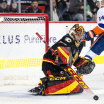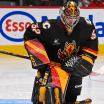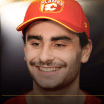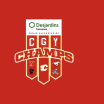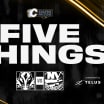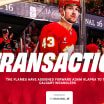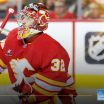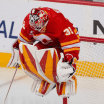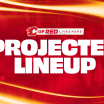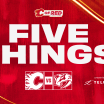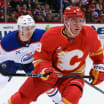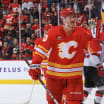Legally changing a surname involves time and paperwork. Besides, it's Saturday, a weekend, and none of the government offices are open.
"Change my name?'' asks Mikael Backlund, plainly puzzled. "To what?"
Why, Mikael Selke, of course.
In the wake of Backlund's heart-palpitating OT winner Friday against the Detroit Red Wings, his 20-odd unofficial campaign managers for the Selke Trophy were busy stumping for their candidate.
"He's known as Mikael Selke around here,'' freshman linemate Matthew Tkachuk told one and all.
So why not make it official?
SELKE CHATTER SURROUNDING BACKLUND
Mikael Backlund's superb season has pushed him into the Selke conversation
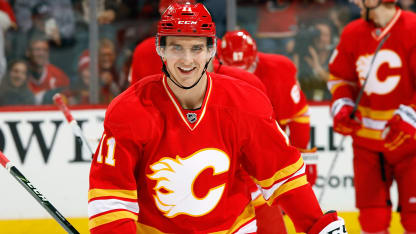
© Gerry Thomas/Getty Images
By
GEORGE JOHNSON @GJohnsonFlames / CalgaryFlames.com
"No, no,'' protests Backlund. "They've been all over me for the last month or so.
"It's a compliment, I guess.
"Just the guys joking around."
Maybe. To a degree. Still, there's a rich, thick, underlying vein of truth in all the wink-wink/nudge-nudge ribbing.
Backlund does deserve serious Selke Trophy consideration.
"Should he be in the conversation?'' says Flames general manager Brad Treliving. "100%.
"In my time here, Backs is a guy who's really been under the radar. Doesn't get the accolades but there's a reason the coaches play him all the time - because he does everything right.
"It's not easy playing against top guys every night, taking every defensive-zone draw. Glen (Gulutzan) and I joke: 'We do everything we can to put Backs 10 feet under water to start every game.'
"He touches so many parts of the game. Plays both sides of special teams. First over the boards for the big faceoff. First over the boards on the penalty kill. You can count those guys on one hand - Kopitar, Toews, Bergeron.
"Those guys help you win.
"Mikael's put himself into that category."
For years, the Selke has been regarded as a Claude Rains "round up the usual suspects" award.
The usual suspects being Patrice Bergeron, Jonathan Toews, Anze Kopitar, Ryan Kesler, Henrik Zetterberg and, until he bolted to the KHL, the mercurial Pavel Datysuk.
Winger Kris Versteeg seems to be spot on when he points out that the Selke is a trophy that takes a few tries before landing.
"It seems, you've got get in there, first,'' he reckons. "Get your foot in the door, get recognized.
"Be up for it two or three years before you actually win. I hope Backs gets in there this year.
"I've played with Toews and Kopitar. The thing about those guys is that they give up offence for defence and sacrifice more for the team than maybe they should sometimes.
"The other thing they have in common is that they show up in situations when they're most needed.
"Awards are popularity contests. For years Shea Weber's been the best d-man in the world, along with Duncan Keith. But he's never won a Norris. Why? Because he played in Nashville. But if he plays in Montreal his whole career, he has two or three Norris' by now.
"The Selke isn't something that should just be a popularity contest. It should be looked at for guys that help a team in every circumstance. Backs does that. Six-on-five offence and defence, four-on-four, three-on-three.
"When you have a guy who plays every situation and leads in all categories, they should be in the conversation.
"For us this year, that's Backs."
Dougie Hamilton spent three seasons in Boston, of course, as a teammate of three-time Selke winner Bergeron. And he can see similarities between he and Backlund, circa 2016-2017.
"We always talked about Bergeron as the perfect player,'' Hamilton recalls. "Couldn't do anything wrong. Backs is similar to that.
"It seems it's been like Kesler, Toews, Kopitar and Bergeron every year. In Boston it was almost a lock that Bergeron was going to win it every year.
"It's good that Backs has put himself in that category, with those guys."
Official league requirements remain unchanged since Bob Gainey collected the first Selke back in 1978 - "demonstrates the most skill in the defensive component of the game" - but the criteria have undeniably evolved, broadened.
The Selke is now more of an award for all-around excellence than strictly shut-down prowess.
"When someone mentioned the Selke you used to think Gainey, Guy Carbonneau, Doug Jarvis, Mike Peca, Lehtinen, guys like that,'' agrees Flames' assistant general manager Craig Conroy, himself a three-time finalist for the award. "Check, check, check.
"But it's really changed.
"Points didn't use to matter. Now they matter.
"Now the award is about a really good player who maybe isn't going to win a Hart but excels in all facets of the game. Defensive play is a big part of it, sure, but it isn't the only part anymore.
"Backs and (Michael) Frolik, either one of them would be a good choice from our team."
Two key elements in any Selke talk:
Position. Centres (of which Backlund is a card-carrying member) have collected 17 of the past 18 Selke trophies.
Team: Awfully hard to land a major post-season trophy would your team miss playoffs. But right now, the Flames are in, very much in contention for one of the three automatic spots out of the Pacific Division and in charge of their own destiny.
Backlund's indispensability to the Flames' push for the playoffs cannot be underestimated.
He not only leads them in goals (20), points (46) and game-winning snipes (6) along with being a plus-11 - like a pitcher in a MLB All Star Game, matched up against a .300 or home-run hitter every trip to the plate - but he's been the catalyst for the team's top line that also includes Frolik and Tkachuk.
"The biggest growth in his game, from my perspective,'' estimates Treliving, "is that he's now willing to jump to the front of the bus in terms of taking responsibility for wins and losses.
"Before the LA game, Mikael Backlund was sick as a dog. He stayed on IVs all day long. He willed his way to play that night. His best game? Maybe not, and he'll tell you that.
"But he still makes the big play at the end of to win the game. That's what we meaning about the next step. You play 82 games, chances are you aren't 100% for 81 of them, outside of the first one.
"How you're able to contribute in those 81 games is what makes the difference in any player. And Backs is making a difference."
The Backlund influence, his confidence, is there, on display, for all to see.
"It's been growing,'' acknowledges the richly-deserving Selke candidate. "When I came into this league, I wanted to be a top scorer. Everybody wants that. That was my mindset.
"I had to learn to play defence. And I've worked on that, becoming a dependable two-way player.
"Since I've in the league I've been trying to take more charge on the ice. Play with more swagger and confidence. A few years back I felt I had a few stretch where I felt I was able to produce, and was able to build my confidence back up.
"Now I expect more of myself than five years ago."
More importantly, they do, too.

